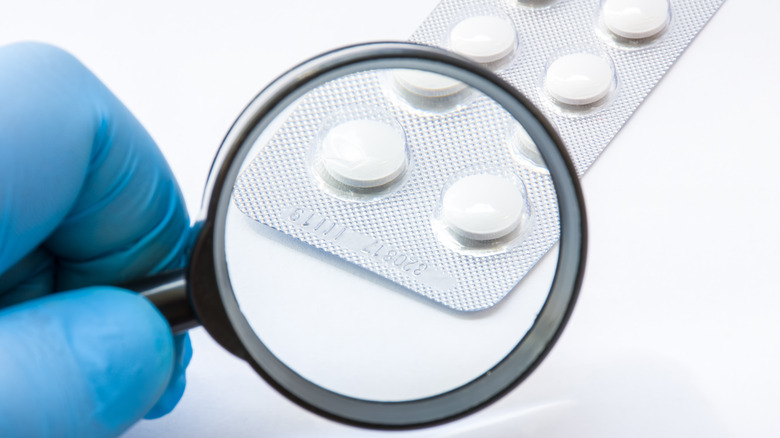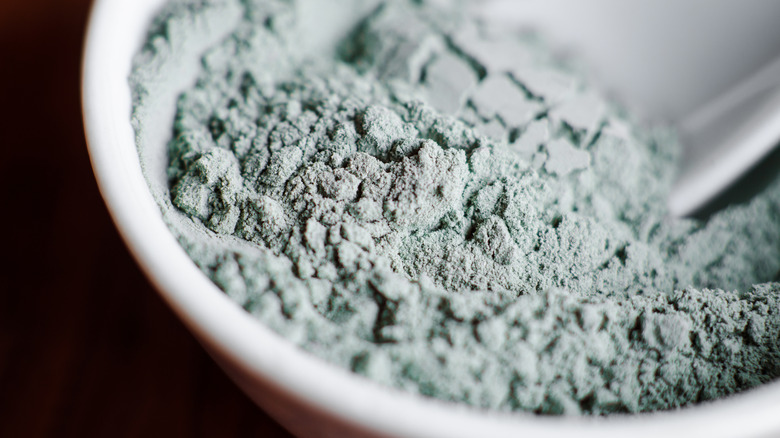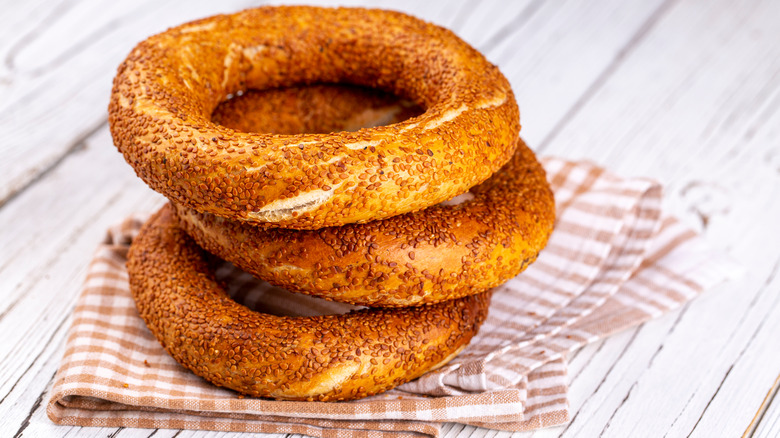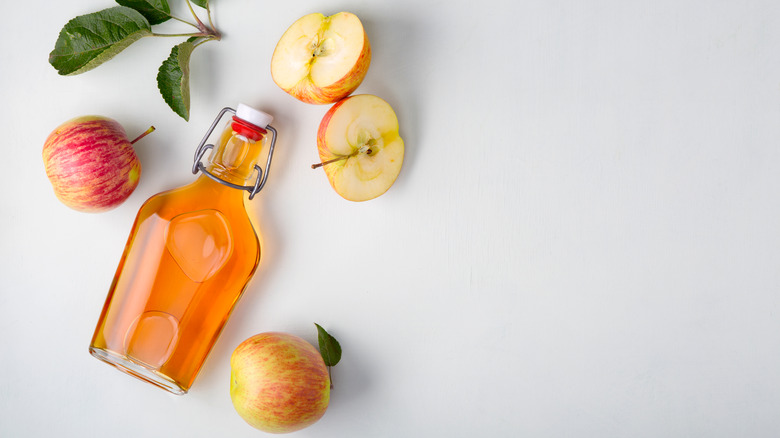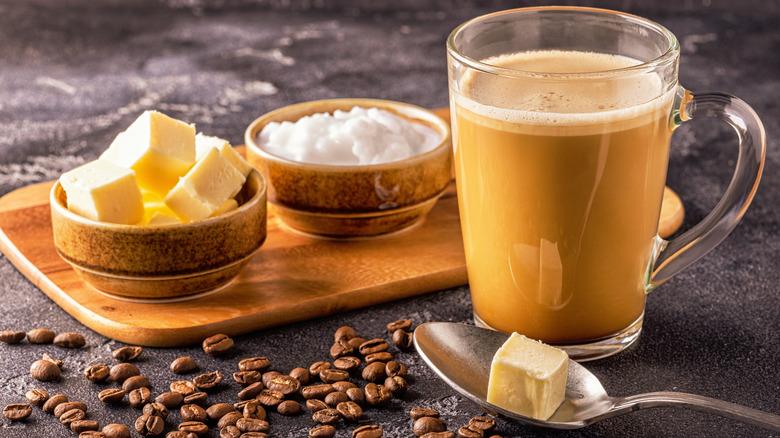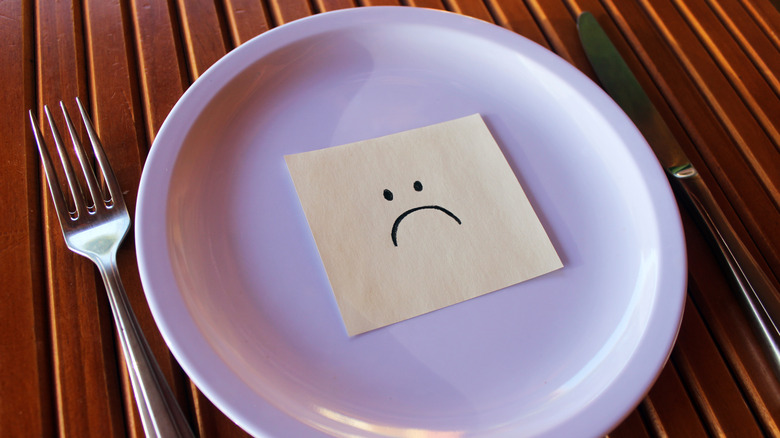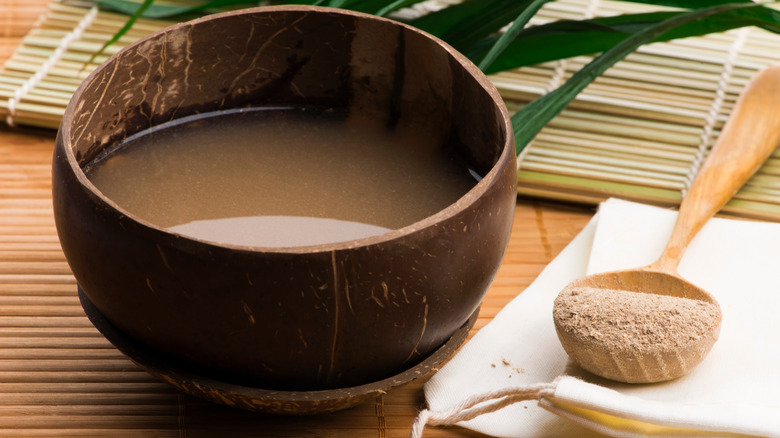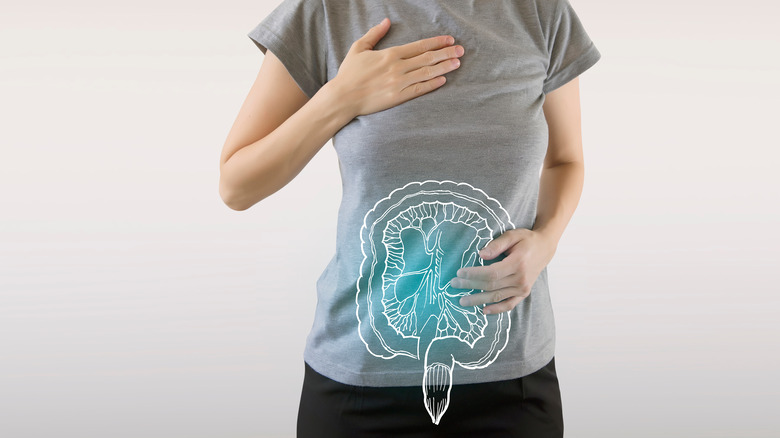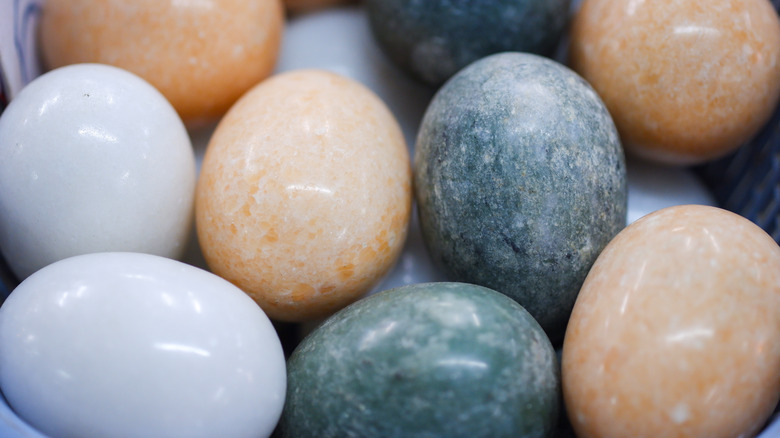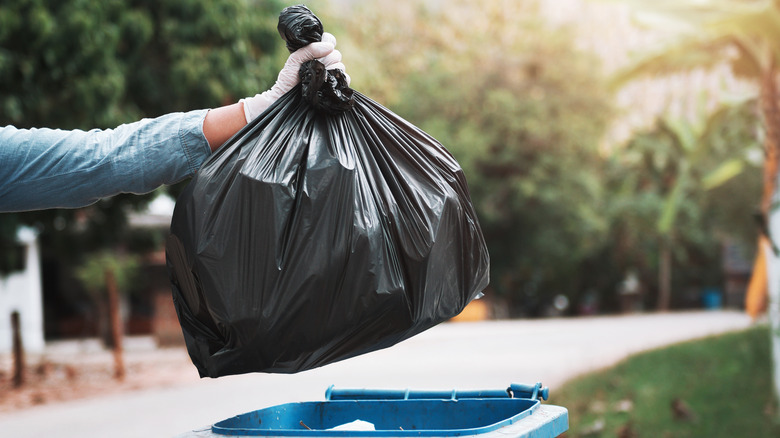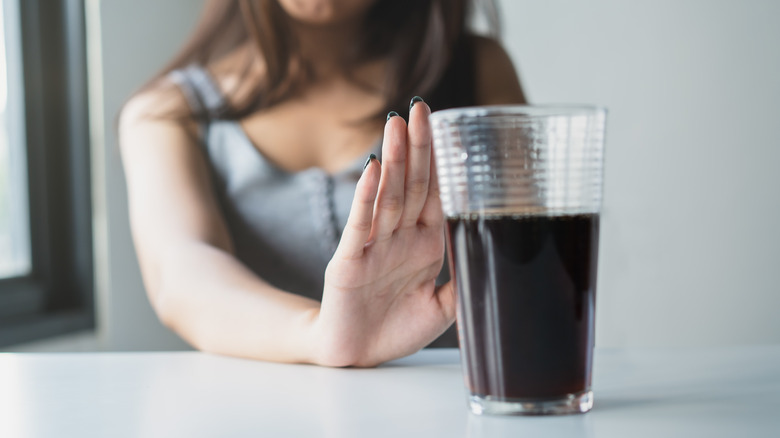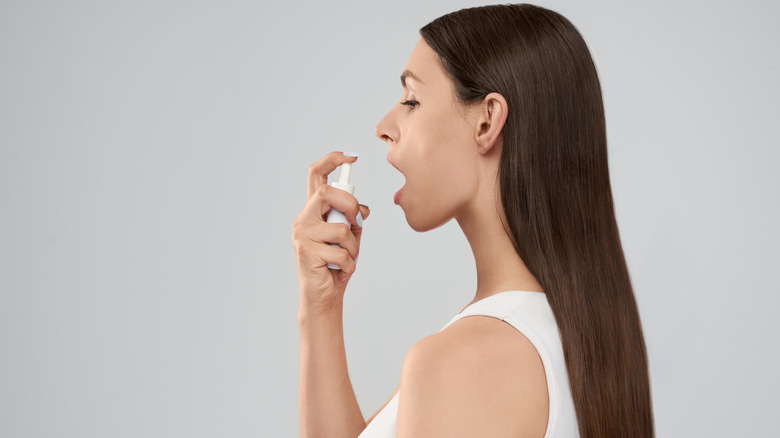Health Products You Thought Were Good For You But Actually Aren't
Occasionally, we all fall victim to shiny marketing and the promise of something better than what we currently have, from appliances to skincare to workout routines, etc. These days everyone has a platform that can be used for good, or to spew misinformation and perpetuate rumors. This is unfortunately incredibly prevalent when it comes to products pertaining to health and wellness.
From diet hacks to sauna suits to myriad supplements for lawd knows what, it seems like anyone can just have an idea, snap their fingers, and — BAM — sell it. Whether sold by a Kardashian or some girl from your high school biology class, many of these products are harmful or come with side effects far worse than the perceived issue you are trying to rectify. Let's all take a step back from the gimmicks and consult science when it comes to health and wellness products. We rounded up some wild products and scoured the internet to sort the fictional from the factual.
Waist trainers
We all know someone who got really into body building and "Keeping up with the Kardashians" and decided that waist trainers are the "it" device to make all of your physical concerns just melt away. However, corsets fell off the face of the earth for a reason. Why must we reinvent these torture devices?
The notion behind waist trainers is that they train your waist to be slimmer and create a more apparent hourglass shape (via Healthline). These restrictive garments train your waist to be smaller in the same way that training bras train pre-teen girls breasts to ... oh right, they don't get trained to do anything. Initially, a waist trainer might encourage a loss of water weight because of how stifling they are. You are likely to drop water weight by sweating. Furthermore, because the boning and closure systems can be so compressive, you might eat less because your stomach is literally being forced to share real estate with your spleen and large intestine — and this internal rearrangement, incidentally, can cause damage to your organs over time. Wearing a waist trainer during exercise might inhibit your oxygen intake, too, which isn't conducive to having a good workout at all.
In sum, wearing a waist trainer to lose weight might cause breathing problems, internal organ damage, and digestive complications. This is in addition to them having the same efficacy as taking your pet betta fish to puppy training lessons.
Edible clay
If you just read "edible clay" and thought, "Huh? People eat dirt now, I guess," you're on the right track. Geophagia, the practice of eating dirt, has waxed and waned in worldwide popularity throughout history (per Healthline). Pica is an eating disorder in which people consume non-food items, which often include dirt. There is very minimal evidence to support that eating dirt straight-up can benefit a human body.
Despite this, bentonite clay — a powder derived from old volcanic ash — is having its fifteen minutes of fame (per WebMD). This is still, in essence, dirt eating, but with a twist. Bentonite clay is commonly used in products that you can safely put on your body. So someone was like, "Hey, let's change the preposition and see what happens!" While bentonite clay-containing products are great for reducing acne-causing oil on skin, consuming it can some with a side effect of health problems. Experts caution people against the consumption of clay because it can contain a hefty dose of heavy metals and germs, and can cause intestinal blockages. Doctors and researchers agree that the trace minerals that can be absorbed through eating bentonite clay are more readily available in more, um, traditional food sources. They also caution us to avoid falling prey to the idea that bentonite clay can help us detoxify our systems; our livers and kidneys generally do a pretty good job.
Gluten-free baked goods
Though the height of the gluten-free fad seems to have lost a bit of fervor, avoiding gluten is still thought by some to be a healthier way to eat. However, this isn't always the case, as gluten is not harmful for all bodies, especially when consumed in moderation (Mayo Clinic). The trouble starts when people begin swapping a glutenous snack for a gluten-free one. Commercially made gluten-free baked goods are just as unhealthy as their gluten-containing equivalents. The gluten-free options often contain just as much fat, highly-refined sugar, and carbohydrates. They also tend to have lower quantities of protein and vitamins. Gluten-containing products come with a slight redemption in the form of B vitamins, such as riboflavin, niacin, and folic acid. Furthermore, gluten flour usually contains some iron, an element that most gluten-free products are lacking. Overall, moderation is key when it comes to indulging in sweets, no matter the type of flour they are made out of. But don't let #glutenfreelife fool you, it isn't inherently healthier than enjoying the occasional butter croissant.
Apple cider vinegar gummies
Apple cider vinegar is delicious if you like drinking a substance that tastes like the lovechild of a Washington apple shot and bleach. The purported health benefits and the evidence to back these claims is mounting, so apple cider vinegar has become known as a magical health elixir (per The Healthy). It can likely help regulate blood sugar levels and manage diabetes, help with weight loss, increase the quality of your skin, and more. But the taste of it is incredibly acidic and off-putting to some people, not to mention harmful on the enamel of your teeth. Enter, apple cider vinegar gummies, a product that takes something that doesn't taste good and turns it into candy in the name of health.
Apple cider vinegar gummies and their effects have not been thoroughly studied, so don't discount them just yet. But even if these gummies might deliver the same effects as the liquid form, they come with extra ingredients that might not help your health after all. Most apple cider vinegar gummies are made with cane sugar, other sweeteners, gelatin, and pectin. None of these extra and admittedly delicious ingredients are particularly harmful in moderation. But the added sugar, specifically, might detract from the ultimate goal of pristine health.
Bulletproof coffee
At this point, we've all heard about putting butter in our coffee, though no one has been able to specifically say why this is supposed to be healthier than regular coffee. Well, it isn't. True bulletproof coffee is made by blending black coffee, unsalted butter, and medium-chain triglyceride (MCT) oil in a blender and enjoying this diarrhea propellant beverage instead of breakfast (via Healthline). There is not harm in enjoying this concoction as a treat on occasion, though why you wouldn't opt for a latte like the rest of us is unfathomable. If consumed consistently, though, this coffee fad might not be a healthy choice. The sheer amount of fat in this beverage is likely to suppress your appetite, which is cool and useful since it's supposed to replace your breakfast. But drinking bulletproof coffee instead of a nutritious meal will provide your body with less of the healthful nutrients that it needs to truly thrive. Mathematically speaking, if you typically eat three healthy meals a day and then start skipping one, you'll be decreasing your total nutrient intake by a third.
Additionally, the jury is out on whether or not saturated fat is the root of all evil, but most experts agree on one thing — the amount of saturated fat you consume should be limited, as it is unhealthy in large doses. Additionally, butter has been proven to contribute to increases in "bad" cholesterol, also known as LDL, more than other dairy products. So, bulletproof coffee might not be a health trend after all.
VacciShield
Vaccines are a super hot topic in the media right now. VacciShield is a product that is geared towards parents, for their children, to "fill in the gap in the vaccination process" (per Science Based Medicine). However, the aforementioned gap remains shrouded in mystery, as there's nothing to suggest that the average kid's immune system needs backup during vaccination. VacciShield can allegedly support healthy brain, immune, gastrointestinal, and detoxifying function, which the creator seems to believe are threatened by standard vaccinations.
The main ingredients in VacciShield – including probiotics, 5 vitamins, 2 minerals, and L-glutamine — appear to be harmless enough. In fact, the Mayo Clinic recommends supplementing a newborn's diet with small amounts of vitamin D, though this is generally recommended as a vitamin D-fortified formula. But this advice does not hold true when it comes to vitamin C. According to Healthline, it is rather unnecessary to provide excess vitamin C, especially to babies. If you choose to, they recommend a moderate 40-50 mg, depending on the age of your child. By contrast, VacciShield contains 125 mg in the dose recommended for 0-4-year-olds, which is a bit much. Though symptoms are typically mild, too much vitamin C can cause intestinal problems like diarrhea, bloating, and discomfort (via Medical News Today). Another notable ingredient in VacciShield is the heaping helping of probiotics, which are understudied and not recommended to give to infants unless advised by your medical professional (per Healthline). Ultimately, the science doesn't support VacciShield being a need, nor a good choice to give to your child; it appears to be healthy, but potentially isn't.
The Master Cleanse
The Master Cleanse is a fancy starvation diet that devout followers rant and rave about (per Healthline). However, this "cleanse" does more harm than good. The Master Cleanse is a 10-day (at least) situation in which you don't eat. Instead, whenever you feel hungry — which must be constantly — you imbibe in some spring water doctored up with maple syrup, lemon juice, and cayenne pepper. At least six servings are required per day. Herbal teas and laxatives are allowed, if not encouraged, in addition to drinking a quart of salt water every morning to stimulate bowel movements.
The Master Cleanse rose to popularity because people believed it worked for weight loss, which is does because — newsflash! — starvation is a very effective temporary weight loss tactic. By creating such a dramatic calorie deficit, weight is lost, and you'd better believe you'll save a few bucks on groceries. But following such a strict plan means that your body will not be receiving the micro and macro nutrients it needs to sustain life. On the Master Cleanse, you'll mostly be getting calories from the maple syrup, which is yummy, but is only sugar. Six servings per day is the equivalent of about 138 g of sugar, far more than the recommended amount. Negative side effects abound from starvation and the Master Cleanse alike. These side effects include, but are not limited to, gallstones, constipation, bloating, abdominal pain, nausea, electrolyte imbalances, and blood sugar complications. This is definitely a trend that should be politely declined by one and all.
Kava
Kava is fairly popular nightshade vegetable that might offer some exceptional health benefits (via Healthline). The active ingredients in the plant are called "kavalactones," which some studies have found might help reduce anxiety and pain sensations, promote better sleep, and protect neurons from damage. However, kava can have a negative impact on some people as well. Back when Britney Spears was still dating Justin Timberlake and Paris Hilton was popular, quite a few reports of liver toxicity as a result of ingesting too much kava were publicized. As a result, many countries banned and restricted access to kava and substances containing it. Kava is broken down by liver enzymes, the same enzymes that break down other medications and drugs. As it turns out, Kava can overwhelm the liver and prevent the enzymes from breaking down other drugs, which can lead to toxicity.
Though kava is less regulated than it used to be, experts caution that it is likely only safe for short-term use. So while it's popularity grows, it is best to experiment under the guidance of a doctor and as always, with moderation.
Detox teas
If you have not yet been inducted into #bachelornation, welcome. The arc goes like this — go on a reality TV show, gain a ton of followers, and start pushing detox teas. Unfortunately, the problem with these teas runs deep, and it's not just former Bachelor franchise contestants trying to hock this stuff (ahem, Kylie Jenner).
Since detox teas tend to fall into the "supplements" category in the eyes of the FDA, they are far less regulated than things that fall into the "medications" category (via Bustle). From Flat Tummy Tea to FitTea, these thinly veiled weight loss supplements are targeted toward women who are already actively dieting. Detox teas appear to follow the same blueprint when it comes to preying on women's insecurities advertising: They use buzz words like "wellness" and "toxins" coupled with a photo of a young woman's flat and airbrushed abs beneath her alabaster smile. It is highly fictionalized, aspirational marketing at its finest.
When boiled down (pun intended), the teas combine caffeine with laxative-like substances that culminate in a "lighter" feeling, though the main thing being lost is water weight. Over time, laxative use can harm a handful of bodily systems and functions, leading to gastrointestinal problems and potential deficiencies in essential nutrients. In general, we should all collectively swear off of the word "detox" as it is — it's misleading. Our livers and kidneys work really well to keep our bodies clean and functional. There is no need to supplement with an expensive tea sold by someone with a team of fitness professionals and unlimited access to FaceTune.
Colonics
Colonics are yet another perpetual fad that celebrities cite at the best way to rid bodies of "toxins." If you like the feeling of prepping for a colonoscopy, that's fine (and weird), but irrigating your colon isn't all it's cracked up to be. When it comes to colonics and enemas, the potential risks greatly outweigh the unproven benefits (per Mayo Clinic). People have actually died from coffee enema use, so that is something to be aware of. Forcing liquid into your colon can increase your risk of extreme dehydration and cause serious electrolyte imbalances. At-home colon cleansing can also cause tears or perforations in the rectum and introduce bacteria, which can cause infections. If your doctor recommends an enema to prepare for a procedure, you are likely to bypass the risks. However, colon cleansing should not be done regularly at home, especially without the supervision of a medical doctor.
Yoni eggs
Sure, yoni eggs existed before Gwyneth's Paltrow started using them, but most of us didn't know about them, and likely for good reason. Yoni eggs are egg-shaped rocks that are meant to be inserted into the vagina for reasons that don't really make any sense. But hey, Gwyneth once stated on her blog that they used to be used by Chinese royalty and they were strictly guarded because of their incredible benefits (via BuzzFeed). The statement has since been removed, but we remember, Gwyneth, we remember.
Yoni eggs are meant to be worn (?) anywhere from a few minutes to overnight because they guide the body into an "involuntary Kegel," thereby helping to tone the pelvic floor (via Healthline). Though a stronger pelvic floor is associated with a slew of benefits, according to Healthline, the yoni egg isn't likely to help you achieve that end — indeed, the contraction required to keep it in place is more likely to cause bowel strain and pain in the pelvis, back, and abdomen. Goop also claims that yoni eggs can help balance the female hormones, which is glaringly untrue. Utilizing a yoni egg overnight is a good way to encourage the growth of bacteria within the vagina. Yoni eggs sound like another great "health" product to avoid like plague.
Sauna suits
It seems impossible that we are all still discussing sauna suits, yet here we are. Sauna suits have long been sold as an excellent way to "detox" through sweat. Again with this "detox" word, ugh. The idea behind them is simple: You cloak your body in what resembles a trash bag and go work out (per Healthline). By wrapping yourself in the antithesis of moisture-wicking fabric, you will sweat more. However, there are no detoxification benefits associated with over-sweating. There are definitely risks and negative side effects though.
As with a few other health products that are not healthy for you, sauna suits merely encourage the loss of water weight. The host problems that can be caused by sweating in a non-breathable suit include renal issues, dehydration, electrolyte imbalances, and heart issues. In 1997, three collegiate athletes died as a result of using sauna suits to quickly cut weight. Exercising in sauna suits can easily lead to fatal conditions such as hypothermia, dehydration, and rhabdomyolysis, a condition in which dead muscle tissue enters the blood stream, potentially causing severe kidney problems (per Healthline and WebMD).
Diet sodas
Diet sodas are often touted as a healthy alternative to full-sugar sodas. However, evidence to support that diet soda might actually be harmful is emerging (per Medical News Today). Specifically, this evidence points toward the artificial sweeteners, often called low-calorie sweeteners or LCSs (via Harvard T.H. Chan School of Public Health). The ongoing research names the LCSs as the main culprit that lead to metabolic issues (per Healthline). Scientists suggest that artificial sweeteners could stimulate your appetite and wind up causing you to eat more. LCSs might also arouse the sweet receptors in your brain, and since the diet sodas themselves have zero calories, you might eat more of something sweet later to satisfy those recently awoken receptors. Scientists are quick to state that they are not pointing fingers at diet soda and artificial sweeteners as causes of weight gain, which is more likely caused by other dietary complications. While more research is necessary to confirm the relationship between soda and poor health outcomes, the correlations are clear: Drinking too much diet soda has been linked to heart attack, high blood pressure, diabetes, stroke, dementia, stroke, and nonalcoholic fatty liver syndrome. How is that for a lineup of health consequences?
In the end, the only benefit diet soda consumption offers is that it can help ease your transition away from a habit of drinking regular soda, thereby cutting down on your daily sugar intake. But this benefit can only be reaped if you then kick the diet soda habit entirely in favor of sparkling water (via Medical News Today).
Diet sprays
Diet sprays ... What in the world? Have we thought of every diet gimmick imaginable? It seems to be so. This one is highly reminiscent of the "I Can't Believe it's Not Butter" ads of the 80s and 90s.
Weight loss sprays are pretty simple in concept. They are made of ingredients that are supposed to help people lose weight (via Women's Health). By spraying the liquid directly into your mouth, it is more quickly absorbed into your bloodstream and not metabolized by the liver. There is clearly a puzzle piece missing from this equation, like, the explanation for how this could possibly lead to weight loss. Furthermore, the ingredients used in diet sprays — including tamarind, caffeine, and green tea — are not proven to aid in weight loss. These sprays are marketed as a quick fix, even though the science behind the ingredients and the mechanism of distribution is highly lacking. If you are on the quest for lifelong health and wellness, there are definitely better options out there for you.
